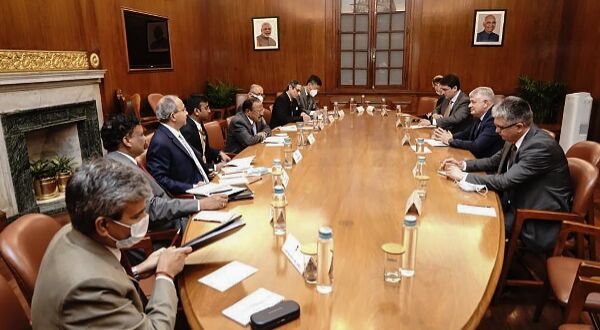Fraught with challenges
India’s effort to find its foothold in Afghanistan to mitigate security and humanitarian crises is resisted by China-Pak duo and the prevailing terror

The situation in Afghanistan remains an issue of serious concern for the world. Besides the usual spotlight on continuing violent attacks and security issues, reports of looming humanitarian crises have come to focus.
For the first time after the change of guard in Kabul, India hosted the Delhi Regional Security Dialogue on Afghanistan, attended by National Security Advisors/Secretaries of Security from Russia, Iran, Kazakhstan, Kyrgyz Republic, Tajikistan, Turkmenistan and Uzbekistan, and headed by India's National Security Advisor Ajit Doval.
It signalled New Delhi's intent to remain an important voice as the situation altered dramatically in its extended neighbourhood on August 15 this year. This meeting comes despite the efforts made by Pakistan to deny India's role in Afghanistan.
Pakistan's attitude towards India is not surprising. For a long time, policy-planners in Islamabad — Pakistan's Army in particular — were against the contributions flowing from New Delhi towards development of Afghanistan, as they were discomforted with ordinary Afghans showing affection towards Indians.
There was little surprise in India after Pakistan chose to spurn an invitation for attending the November 10 meeting while its all-weather friend, China, adopted a more nuanced stance — preferring to engage on bilateral terms instead of the multilateral forum.
Although India was scheduled to host this meeting last year, the global health pandemic led to a change. After Iran held the first two rounds in 2018 and 2019, by choosing to play host amid a changed political landscape, New Delhi, along with Central Asian countries in the vicinity of Afghanistan, was keen in drafting a roadmap.
The emphasis was on no export of terror from Afghan soil; an inclusive regime; protection of minorities, women and children; and attempts to find out a way to provide succour to the people of the country, who are struggling to put food on the table.
A serious crisis is in the making, and unless every country works out a way to make food and medicines available to the people of Afghanistan as winter sets in, there is a threat that migration from Afghanistan could occur sooner than later. Once the situation aggravates, it is reasonable to assume people would start fleeing from Afghanistan to neighbouring countries including India through longer routes.
Ironically, India's earnest move to send consignment of food grains to Afghanistan across land, remains stuck even after a month, as Pakistan is yet to provide clearance and transit passage.
Adding to this paradox, Pakistan hosted a meeting of 'extended troika' in Islamabad on November 11 — attended by representatives from the United States, Russia and China — where the focus was on providing humanitarian assistance to the people of Afghanistan.
An important aspect of the situation is the presence of terror groups in Afghanistan and spread of their disruptive activities to other parts of the world. It is another matter that while acknowledging the outcome of the New Delhi meeting, the Taliban spokesperson maintained that its regime is committed to denying any group a platform to launch terror attacks.
From all accounts so far, the Taliban is yet to come to grips with the situation as it continues to make a transition to administer the country.
Complicating the state of affairs are the periodic attacks from the Islamic State-Khorasan. These attacks are affecting the image of the Taliban in an adverse manner, shearing off the veneer of respectability its leaders are seeking in the form of international recognition. At present, no country recognises the new regime, barring informal engagements by a few countries.
Even before the US forces withdrew from Afghanistan, security and strategic analysts predicted that India could have a possible blowback in Jammu and Kashmir. Recent incidents of increased militant activities in the Union Territory raise levels of concern even as Indian security forces maintain a strong counter-insurgency/terror grid to deal with the altering ground situation.
The Delhi Declaration, adopted on November 10, underscores strong support for a peaceful, secure and stable Afghanistan. The countries attending the meeting were aware that for this to be converted into a workable proposition, the current regime in Kabul should pay heed.
The challenge for the participants is to ensure implementation of another entry in the declaration, calling for collective cooperation against the menace of radicalisation, extremism, separatism and drug trafficking in the region. Conditions in Afghanistan make the ground fertile for these forces to operate with ease, especially in the absence of any formal trade and international funds — frozen since August 15.
Most of the participants in Delhi would also watch with interest the policy China would adopt towards Afghanistan since the Central Asian countries at the table maintain strong bilateral ties with Beijing that is increasingly expanding its role in the country and the region.
Views expressed are personal



